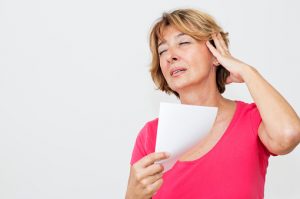 We are all different—from health advantages and predispositions we inherit from our parents to lifestyle choices we make every single day, there are so many factors that shape us and our health. Take menopause, for example. Until a woman actually enters this time of transition (which, by the way, is a completely normal and natural stage), she is faced with all sorts of misleading information that paints a pretty gloomy picture of what life is going to be like after menopause. Hot flashes, night sweats, sleep troubles, intimacy issues… How do you deal with it all at once? The good news is, you don’t.
We are all different—from health advantages and predispositions we inherit from our parents to lifestyle choices we make every single day, there are so many factors that shape us and our health. Take menopause, for example. Until a woman actually enters this time of transition (which, by the way, is a completely normal and natural stage), she is faced with all sorts of misleading information that paints a pretty gloomy picture of what life is going to be like after menopause. Hot flashes, night sweats, sleep troubles, intimacy issues… How do you deal with it all at once? The good news is, you don’t.
Let’s look at some of the myths about menopause and the truth behind them. As you know, knowledge is power—the more you understand your symptoms, the easier it is to manage them.
5 myths about menopause
Myth: No more sex after menopause
Advertisement
Because menopause is marked by a sharp drop in female sex hormones, it’s often assumed that a woman’s libido is plummeting as well. This is not necessarily true. Researchers at King’s College London found that the impact of menopause on the female sex drive is not as large as commonly believed. Pre-existing libido problems, on the other hand, are a more significant determinant of the quality of one’s sex life post-menopause. (Hidden secret to women’s aging health.)
What declining estrogen does affect is vaginal lubrication. Many postmenopausal women experience vaginal dryness, which can make sex painful. This problem can be rectified through the use of prescription low-dose estrogen or even over-the-counter water-based lubricants. Once it’s not painful anymore, don’t be afraid to have sex—an active sex life benefits the health of your vaginal tissues.
Myth: You will suffer from hot flashes
It’s true that hot flashes are one of the most common symptoms of menopause, and 70 percent of women experience them along with night sweats. But aside from the 30 percent who don’t get hot flashes, those who do report very different experiences. A study published in the journal Menopause identified four types of hot flashes. Early onset hot flashes may begin as early as 11 years before the last menstruation, but the symptoms go away with that last period. In late onset women, their last period is when their first hot flash arrives. About 25 percent of women begin to experience symptoms early on and they last long after menopause. Finally, there are indeed women who never get hot flashes.
Myth: You can’t do anything about your symptoms
Hot flashes can be discouraging—but that doesn’t mean you can’t combat them. Exercise is a great aid in dealing with menopause symptoms. A well-known mood booster, regular exercise has been shown to result in fewer hot flash episodes and improved mood. An active lifestyle keeps menopausal women stronger and happier and helps them control their weight.
Myth: You will gain weight
To be completely accurate, menopause doesn’t make you gain weight; rather, it increases your abdominal fat. As there’s less estrogen in the body, fat starts to store in the stomach rather than the hips and thighs (as is the case in younger women). This misconception surrounding menopause and weight may be due to the fact that weight loss, in general, becomes more challenging as the years go by. Understanding what is happening to your body can help you map out your course of action to keep yourself in shape. In a study following premenopausal women through their menopause, participants were able to avoid weight gain with a balanced diet and regular exercise. Experts recommend 2.5 hours of moderate aerobic activity per week.
Myth: Sleep problems are not linked to menopause
Advertisement
They are—women report the most sleep troubles from perimenopause to postmenopause. Other symptoms, such as hot flashes, insomnia, and mood disorders can affect one’s quality of sleep as well. Up to 60 percent of postmenopausal women complain about frequent insomnia. As is the case with other menopause symptoms, regular exercise can help you improve your sleep. For best results, eliminate caffeine (it can take up to eight hours to leave your system), keep the temperature in your bedroom cool to help with your hot flashes, and wear cotton sleepwear for your comfort. (A good night’s sleep is nature’s best medicine.)
Menopause may be a dreadful experience, but it doesn’t have to be as bad if you know how to manage it. Knowing what is happening to your body and what you can do to counteract the symptoms will help you breeze through the transitionary period and embrace this new chapter of your life.
Related: Low estrogen in women: Symptoms, causes, and home remedies
